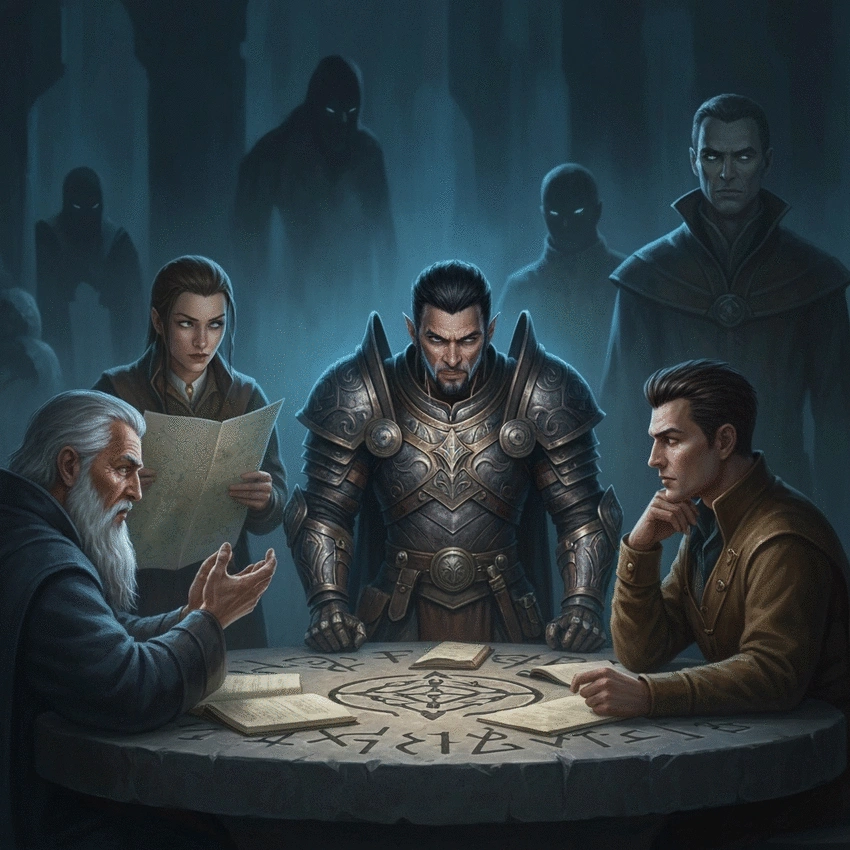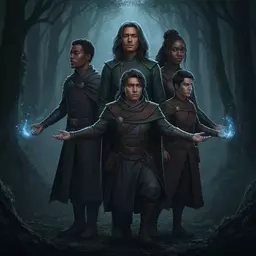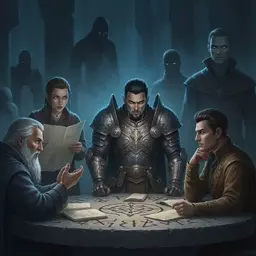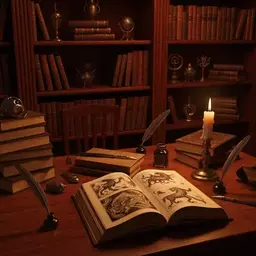Crafting Character Arcs in Dark Fantasy
By Isolde Thorne / Oct 26
In the dim light of a flickering candle, the shadows of our choices dance upon the walls, whispering tales of power and corruption. Have you paused to consider the weight of a single decision in a world where every choice can tip the scales of fate? This is the heart of dark fantasy—a realm where the line between hero and villain blurs, inviting us to explore profound moral complexities.
Dark fantasy thrives on moral ambiguity, weaving intricate narratives through the exploration of characters and societal structures. Below are the key pillars that define these compelling worlds.
Narratives thrive when characters grapple with ethical dilemmas.
Worlds mirror real-life issues, deepening audience engagement.
Challenging good vs. evil creates profound character journeys.
Investing readers in moral complexities is key to powerful storytelling.
Dark fantasy is a genre that delves into the shadows, exploring the intricate dance between light and darkness. At its core, it presents a world filled with moral ambiguity, where heroes and villains are often indistinguishable. This genre captivates readers with its rich tapestry of themes, including power, corruption, and redemption, making it a fertile ground for storytelling that resonates deeply with the human experience.
In dark fantasy narratives, characters grapple with choices that challenge their morals, often leading to profound consequences. The unique challenges presented here invite both creators and audiences to reflect on the deep-seated ethical dilemmas that define our lives. It’s not just good versus evil; it’s a nuanced exploration of the choices that shape our destinies.
So, what sets dark fantasy apart from other fantasy genres? It’s the specific focus on moral complexity and the challenges that accompany it. Readers are drawn into worlds where every character bears the weight of their decisions, often leading to conflicts that mirror our own societal struggles. Research published in the Journal of Business Ethics highlights how narratives exploring ethical decision-making can deeply influence audience perception, a principle central to dark fantasy.
These challenges not only enhance the narrative but also invite readers to engage with deeper questions about morality. At Shadows of Imagination, we explore these themes through character-driven sagas and insightful writing guides, encouraging aspiring authors to embrace the darkness and complexity within their stories.
Morality plays a crucial role in shaping the fabric of dark fantasy worlds. By integrating moral complexity into worldbuilding, writers can create settings that resonate with audiences. Characters who navigate these morally grey areas provide opportunities for readers to reflect on their values and the ethical implications of choices.
As we weave together lore and character arcs, it’s essential to ask ourselves how these moral quandaries shape our narratives. The exploration of morality not only enhances the story but also fosters a community dialogue around the themes we cherish in dark fantasy literature.
Moral ambiguity in characters adds layers of complexity to the narrative. These characters embody the struggles between right and wrong, allowing readers to witness their ethical dilemmas firsthand. In a morally complex society, every choice can lead to unforeseen consequences, creating a rich ground for storytelling. Research in Communication Research further demonstrates how the portrayal of morally ambiguous characters can lead to increased audience engagement and deeper processing of narrative themes.
By embracing this moral ambiguity, authors can create societies that feel alive and reflective of our own. At Shadows of Imagination, we encourage writers to dive into these character complexities in their narratives, discovering the profound effects of their choices.
The societal structures in dark fantasy often serve as a manifestation of the moral decay prevalent in the narrative. Here, political, economic, and social systems can become deeply entwined with themes of corruption. Readers can explore how these structures influence the lives of characters, providing a critique of our own world.
Through these portrayals, dark fantasy serves as a mirror to our own societal issues, prompting readers to question the systems in place within their own lives. By embedding these themes into their storytelling, writers can inspire discussions around morality, ethics, and justice.
Characters who embody grey morality are crucial to the depth of dark fantasy narratives. They often challenge conventional notions of good and evil, prompting readers to reconsider their understanding of morality. This exploration can lead to rich character development and intense narrative conflicts. A study published in Nature Communications on moral decisions in narratives suggests that characters facing difficult ethical choices are more memorable and impactful.
At Shadows of Imagination, we believe that by crafting morally ambiguous characters, writers can create stories that resonate on a profound level. These characters not only enrich the narrative but also challenge readers to reflect on their own moral beliefs and choices.
In the realm of dark fantasy, moral ambiguity can lead to powerful storytelling. What do you think is the most compelling aspect of morally complex characters? Share your thoughts below:
In the intricate tapestry of dark fantasy storytelling, balancing morality and reader engagement is crucial. We want our readers to not only understand the moral complexities of our worlds but to feel invested in them! Here are some strategies to maintain that delicate balance:
By employing these techniques, we can draw readers into the depths of our morally challenging narratives. Each decision made by our characters can resonate with their own experiences, engaging them on a deeper level.
Fostering empathy in our readers is essential when presenting characters embroiled in moral conflicts. Here are a few methods to cultivate this emotional connection:
By revealing the layers behind a character's decisions, we invite readers to step into their shoes. This connection can lead to a more profound understanding of the ethical dilemmas at play, making our narratives all the more gripping!
Resolving conflicts in morally complex narratives can be tricky but rewarding. Here are some effective ways to navigate these intricate waters:
When we approach conflict resolution this way, we deepen the reader's engagement with the story. They become not just passive observers but active participants in the unfolding moral landscape. The journey through the shadows of our world becomes a shared experience, rich with ethical considerations.
Here is a quick recap of the important points discussed in the article:

 Crafting Character Arcs in Dark Fantasy
In the dim light of a flickering candle, the shadows of our choices dance upon the walls, whispering
Crafting Character Arcs in Dark Fantasy
In the dim light of a flickering candle, the shadows of our choices dance upon the walls, whispering
 Crafting Morally Complex Dark Fantasies
In the dim light of a flickering candle, the shadows of our choices dance upon the walls, whispering
Crafting Morally Complex Dark Fantasies
In the dim light of a flickering candle, the shadows of our choices dance upon the walls, whispering
 Exploring Dark Fantasy Narratives
In the dim light of a flickering candle, the shadows of our choices dance upon the walls, whispering
Exploring Dark Fantasy Narratives
In the dim light of a flickering candle, the shadows of our choices dance upon the walls, whispering